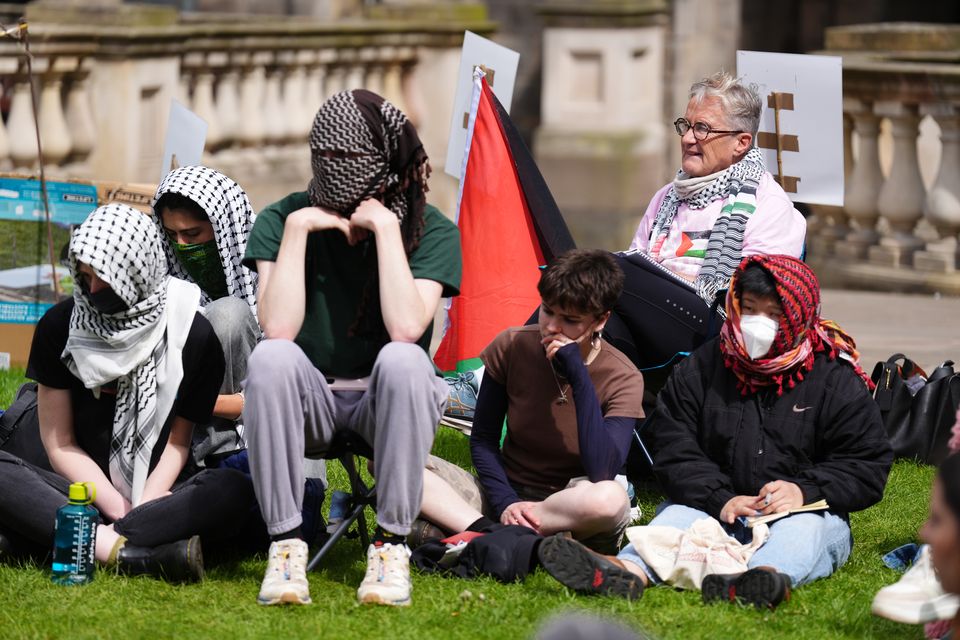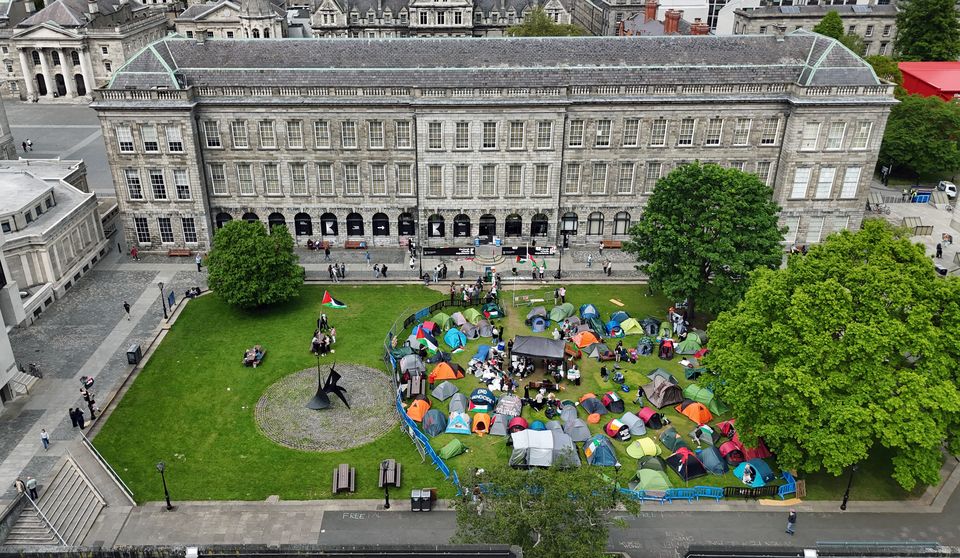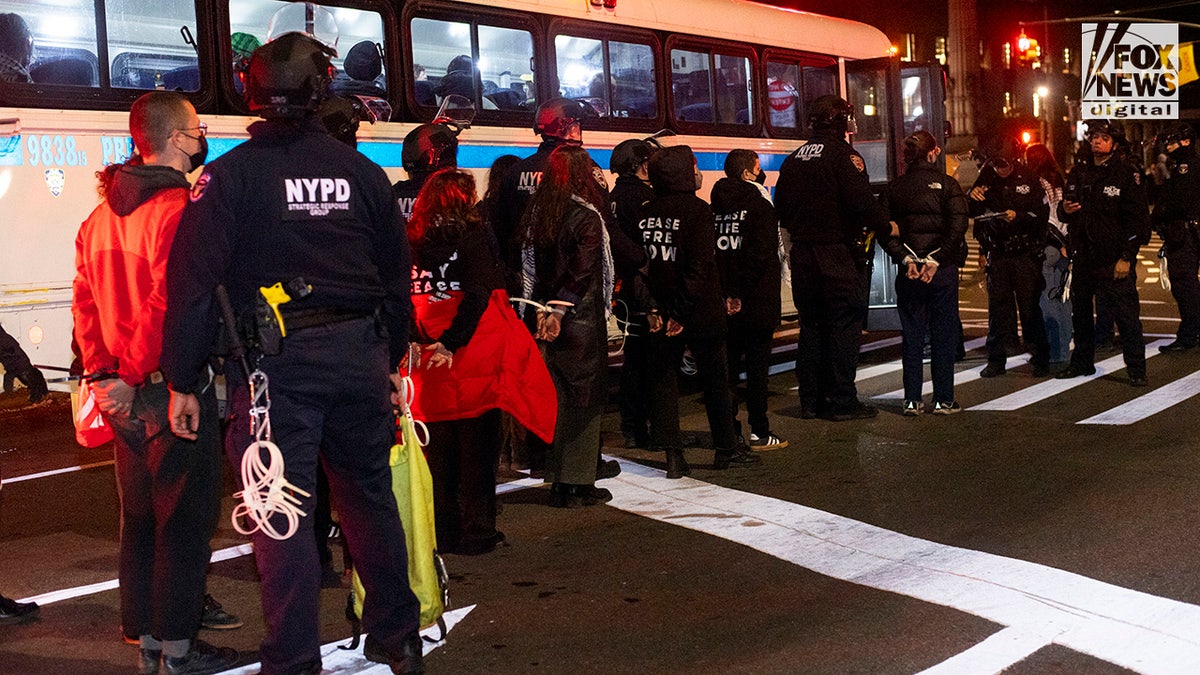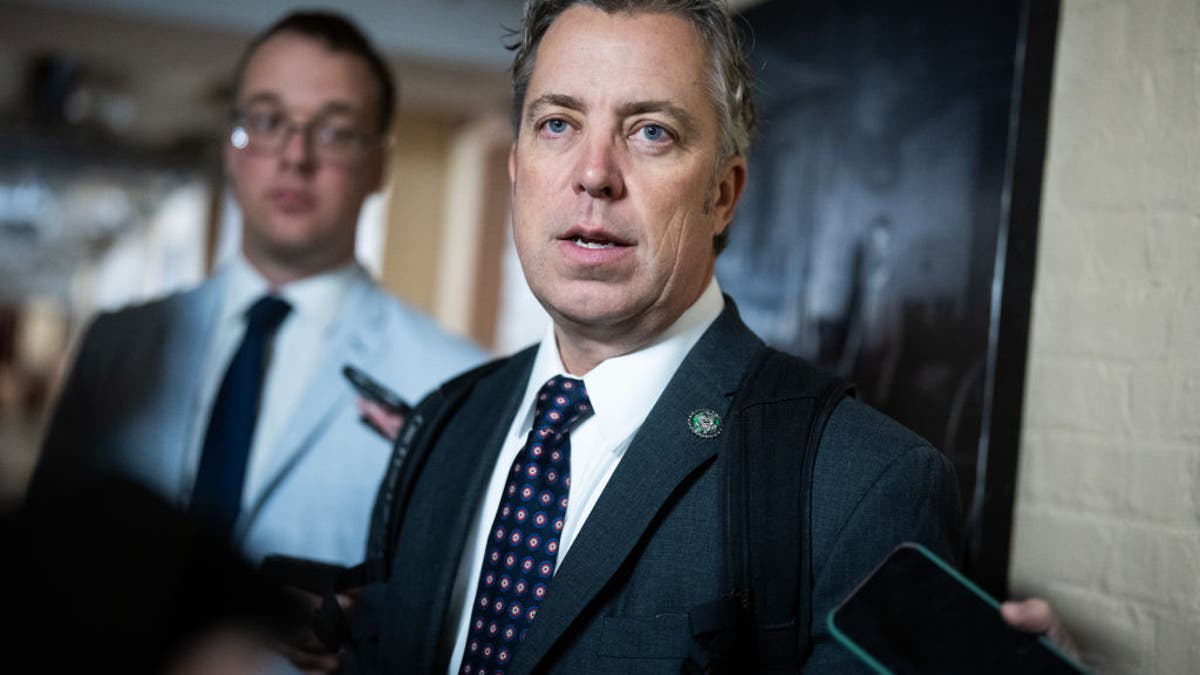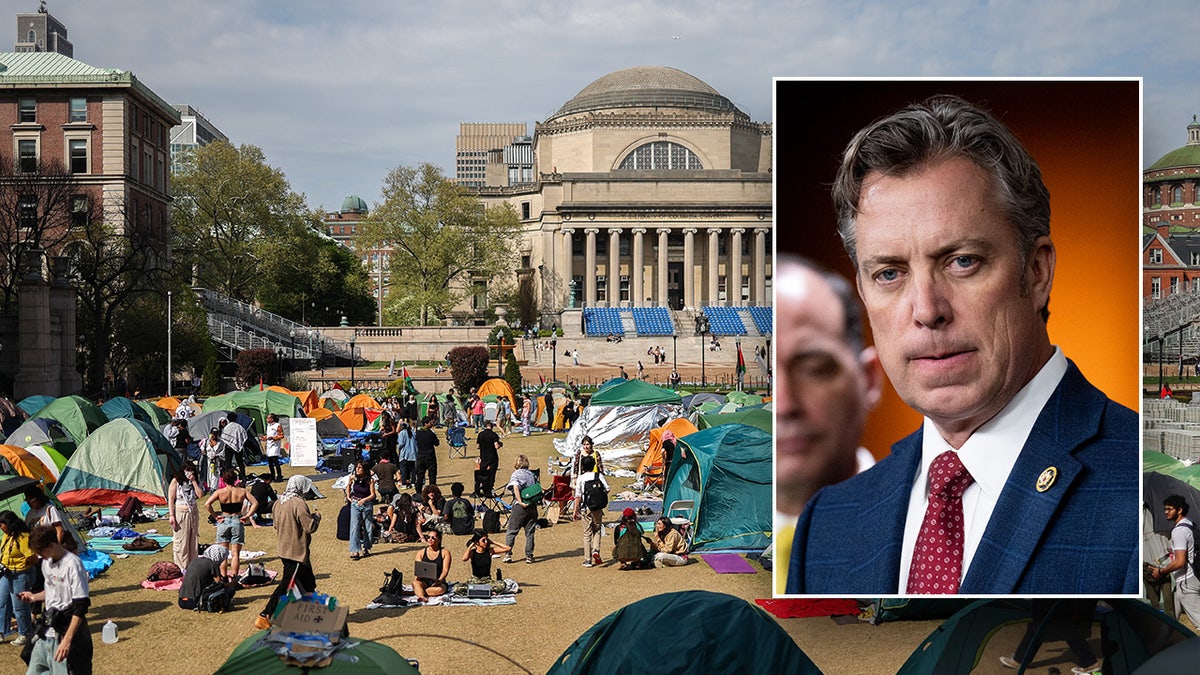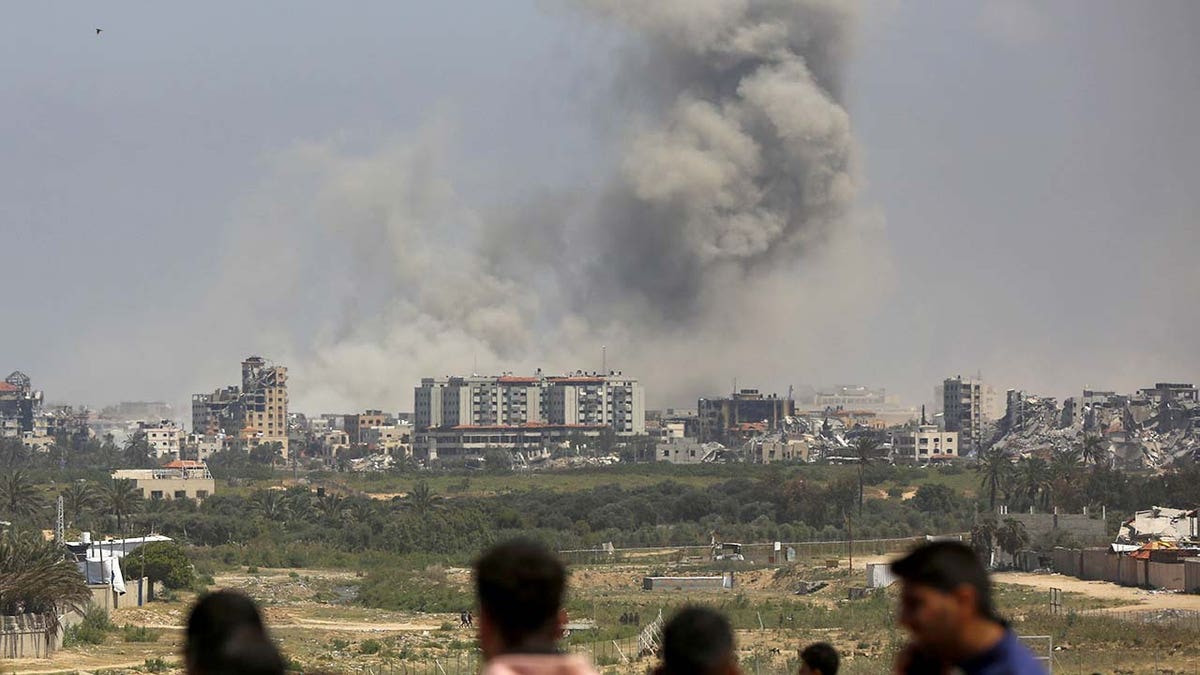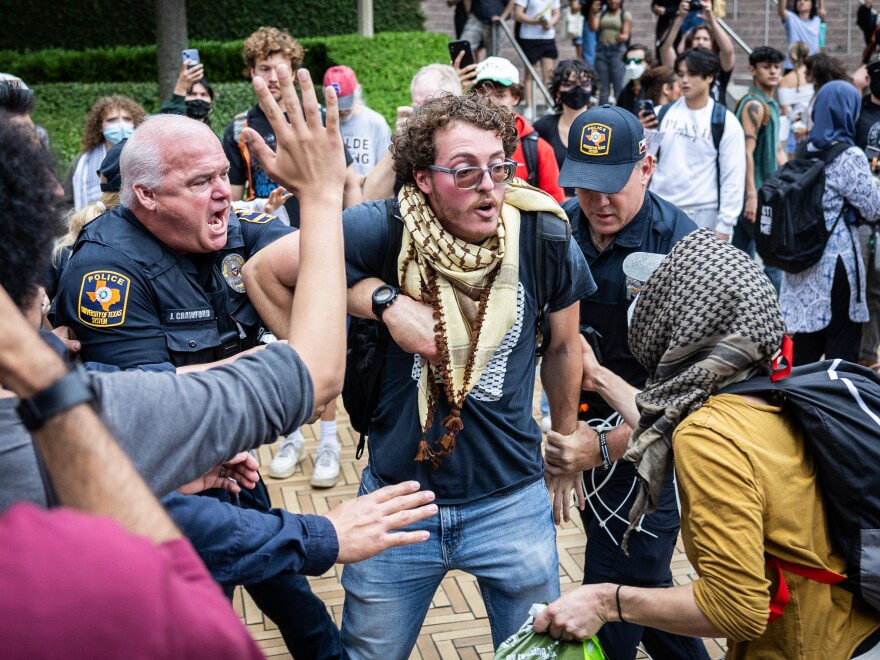AFP
May 8, 2024

Pro-Palestinian encampments have sprung up at UK universities following similar action in the United States - Copyright AFP BENJAMIN CREMEL
Akshata KAPOOR
The grass outside SOAS University of London has been dotted with a handful of tents since the start of this week, with Palestinian flags and slogans calling for a ceasefire in Gaza.
There are similar sites at universities across Britain, and so far the protests have been peaceful and left alone by the police, unlike in the United States, France and other countries.
Students, many of whom were masked, sat in a circle on a blue tarpaulin to take part in what they called a “teach-in” while others took stock of groceries and supplies piled up inside the shelters.
At SOAS, former student Yara, 23, estimated that more than 20 students were taking part — with about a dozen other encampments at universities elsewhere in the UK, following protests on US campuses in April.
The aim, she told AFP, was to “apply pressure on the SOAS administration to adhere to the demands of the students”.
That includes disclosing links to and divesting from all companies complicit in what she said was “Israel’s illegal settlement economy and arms trade”.
– Solidarity –
Warwick University in Coventry, central England, kicked off first with a “Gaza solidarity encampment” on April 26.
Tents then sprang up outside universities in Newcastle, Edinburgh, Manchester, Leeds, Cambridge and Oxford.
At Edinburgh, a group of students began a hunger strike to call for a ceasefire in Gaza. In Cambridge, orange tents were lined up neatly outside King’s College, which dates back to 1441.
Cambridge said in a statement that it respected the freedom of speech and right to protest, adding that it would “not tolerate anti-Semitism, Islamophobia and any other form of racial or religious hatred”.
Jewish students have voiced concerns for their safety and Prime Minister Rishi Sunak is mindful of similar problems in the UK as protests in other countries turn violent.
He has called university vice-chancellors for a meeting to discuss the safety of Jewish students in universities, and denounced an “unacceptable rise in anti-Semitism” on campus.
British charity the Community Security Trust, which tracks anti-Jewish hate crime, says there have been “unprecedented levels of anti-Semitism” since Hamas’s unprecedented October 7 attack on Israel and Israel’s military response.
The attack resulted in the deaths of more than 1,170 people, most of them civilians, according to an AFP tally based on official Israeli figures.
Militants also took about 250 hostages. Israel estimates 128 of them remain in Gaza including 36 who officials say are dead.
Israel’s military campaign has killed at least 34,844 people in Gaza, mostly women and children, according to the Hamas-run territory’s health ministry.
The SOAS students were given support on Wednesday by Jeremy Corbyn, the veteran left-winger who led the main opposition Labour party from 2015 to 2020.
Corbyn said the university should “recognise that students have strong, legitimate, valid opinions”.
“They shouldn’t be closing down protests. They should be recognising the very strong humanitarian views of young people all across this country,” he said while attending a rally at the camp.
Corbyn, now suspended from the Labour party, was accused of allowing anti-Semitism to flourish during his tenure, and once called Hamas and their Iran-backed allies Hezbollah “friends” — comments he later said he regretted.
– ‘As long as it takes’ –
Yara, who has been at the camp since it sprung up three days ago, said the student protesters were planning to “stay for as long as it takes” for SOAS, which specialises in Africa, Asia and Middle East studies, to accept their demands.
“The first night was really rainy and wet and muddy,” she said.
“But honestly, no matter how much discomfort students may feel camping out, it’s actually just a fraction of the conditions in which the Palestinians in Gaza have been experiencing.”
Having previously only attended the protests, where dozens more students gathered, one 19-year-old SOAS student who studies global development and law said they planned to join the camp this weekend.
“I don’t think I can wait until my degree’s over because people are dying. So being in encampments is as useful as I can be,” said the student, who did not wish to be named.
“I just said I’d be here because they need people. And I am people.”
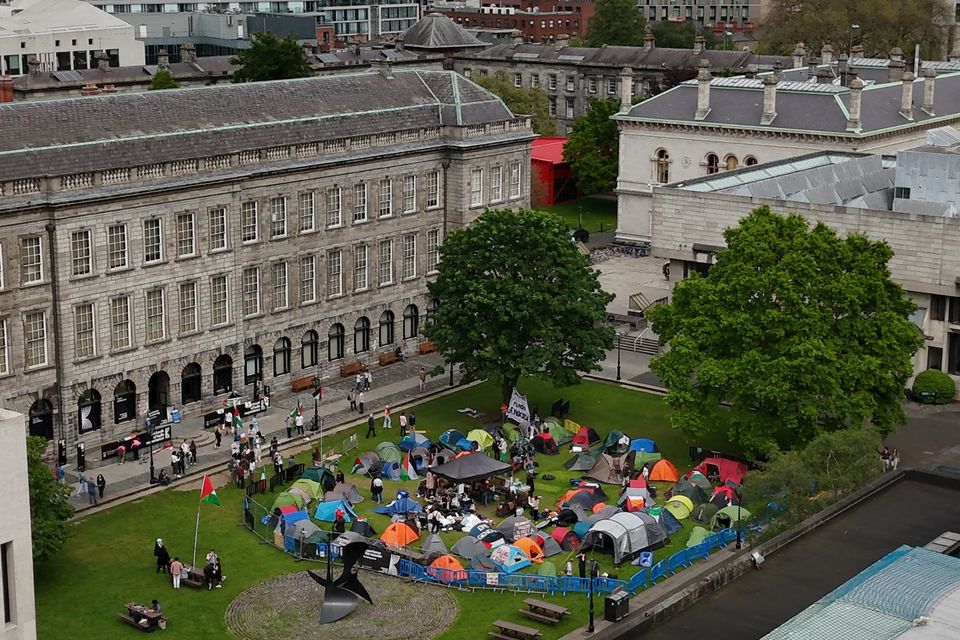
Students taking part in an encampment protest over the Gaza conflict on the grounds of Trinity College in Dublin (Niall Carson/PA)
By Cillian Sherlock and Cate McCurry, PA
A student encampment protest at Trinity College Dublin is to end following an agreement between senior management and protesters.
Visitors have been unable to access the historic Book of Kells since action began on Friday evening when the activists set up tents inside the campus of the prestigious Dublin university.
The students taking part in the protest had vowed to maintain the blockade until the university cuts all ties with Israel.
University management met with student representatives on Wednesday to discuss the situation.
In a statement, Trinity said it will complete a divestment from investments in Israeli companies that have activities in the Occupied Palestinian Territory and appear on the UN Blacklist in this regard.
This process is expected to be completed by June.
It said it would “endeavour” to divest in other Israeli companies, noting that its supplier list contains just one Israeli company which will remain until March 2025 for contractual reasons.
Senior Dean Professor Eoin O’Sullivan, who led the talks for Trinity, said: “We are glad that this agreement has been reached and are committed to further constructive engagement on the issues raised.
“We thank the students for their engagement.”
Trinity said plans are being put in place to return to normal university business for staff, students, and members of the public.
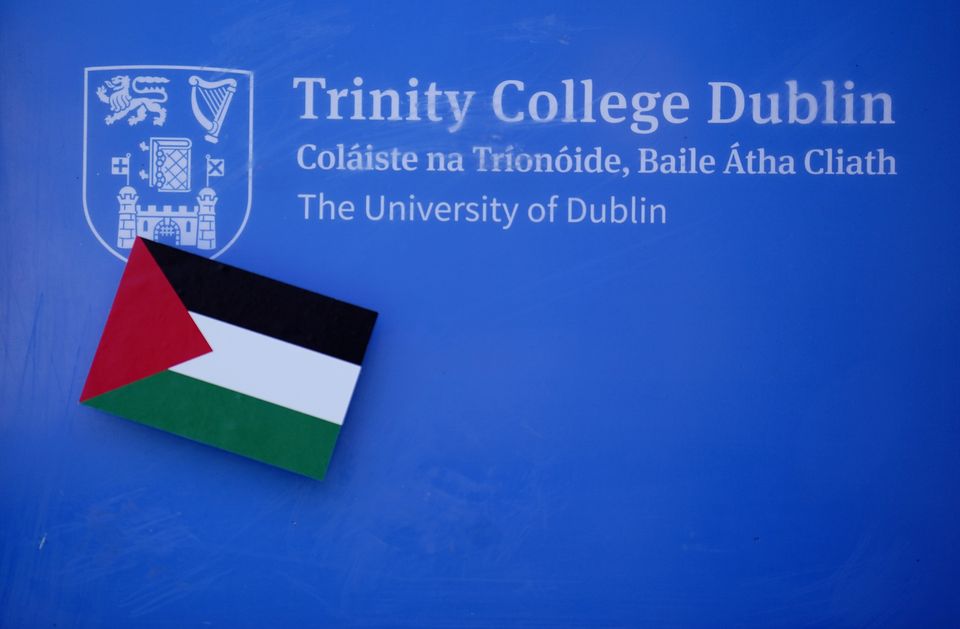
A Palestine sticker on a sign at the entrance to Trinity College in Dublin (Brian Lawless/PA)
Outgoing students’ union president Laszlo Molnarfi said the resolution of talks with the university was an “unprecedented” result.
Speaking to the PA news agency, Mr Molnarfi said: “Students, staff and the public united have pushed Trinity towards boycott, divestment and sanctions (BDS).”
He said he hopes the protest at the university will inspire other students.
“It shows the power of grassroots student and staff fighting for a just cause of Palestinian liberation and to end complicity with Israeli genocide, apartheid and settler colonialism.
“Students over the world are standing up for what is right.”
In its statement on Wednesday, Trinity said: “We fully understand the driving force behind the encampment on our campus and we are in solidarity with the students in our horror at what is happening in Gaza.
“We abhor and condemn all violence and war, including the atrocities of October 7th, the taking of hostages and the continuing ferocious and disproportionate onslaught in Gaza. The humanitarian crisis in Gaza and the dehumanisation of its people is obscene.
“We support the International Court of Justice’s position that ‘Israel must take all measures within its power to prevent and punish the direct and public incitement to commit genocide in relation to members of the Palestinian group in the Gaza Strip.’
“A real and lasting solution that respects the human rights of everyone needs to be found.”
The scenes at Trinity follow a wave of similar student protests at university campuses across the US.
The encampment was initiated days after it emerged that the university authorities had fined the students’ union more than 200,000 euro over previous protests on campus.
It invoiced the union for 214,285 euro after a series of demonstrations about fees and rent, as well as pro-Palestinian solidarity protests.
The university cited a loss of revenue due to blockades of the Book of Kells and famous Long Room library among the reasons for the fine.
The protesting students called for a “retroactive amnesty” for students involved in protests on campus and the rescinding of the bill imposed on the student’s union.
Asked about the status of the fines, Mr Molnarfi said this was a matter for further engagement with the university.
Trinity is also establishing a taskforce on related matters with student and staff representatives, led be an external chair.
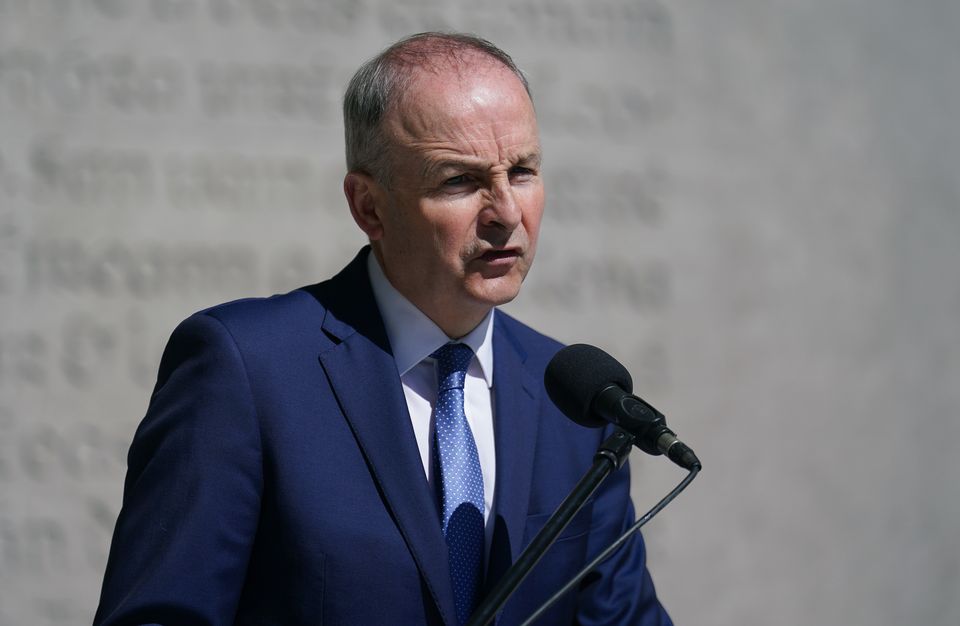
Tanaiste Micheal Martin (Brian Lawless/PA)
Elsewhere, the Irish deputy premier said he is “horrified” by events unfolding in Rafah, describing the levels of violence as “unconscionable”.
Israel has threatened to launch a full-scale assault on the southern Gaza city.
More than one million civilians are sheltering in Rafah after evacuating other parts of Gaza amid Israel’s war in the region.
The Israeli military seized control of Gaza’s vital Rafah border crossing on Tuesday.
On Wednesday, Israeli troops said they had reopened the Kerem Shalom crossing into Gaza, a key terminal for the entry of humanitarian aid that was closed nearly three days earlier after a Hamas rocket attack.

Protesters demonstrated outside Leinster House in Dublin calling on Israel not to invade Rafah (Niall Carson/PA)
Tanaiste Micheal Martin said he was “really horrified” with the events.
Speaking at the Arbour Hill commemoration event, Mr Martin said: “It’s quite shocking, the level of human suffering.
There is an urgent need for medicines, for food and for the basics of life to get in for the people of Gaza. It's only unconscionable that this level of violence continuesTanaiste Micheal Martin
“The civilian causalities, death and very serious injuries on a daily basis being (endured) by the people of Gaza.
“The taking of the Rafah crossing, for example, creates huge challenges for humanitarian aid getting into Gaza.
“I have seen myself the amount of aid has been stopped already.
“There is an urgent need for medicines, for food and for the basics of life to get in for the people of Gaza.
“It’s only unconscionable that this level of violence continues.

Protesters called for sanctions against Israel (Niall Carson/PA)
“We need an immediate ceasefire and the release of all hostages and then we need discussion on the political track on how Gaza is reconstructed because what the people have gone through there is quite horrific and it is shocking and unacceptable, it has to stop.”
On Wednesday, protesters from the Ireland-Palestine Solidarity Campaign gathered outside Leinster House in support of the hundreds of thousands of Palestinians in Rafah.
Demonstrators waved Palestine flags and called for Israel not to invade Rafah and to impose sanctions against Israel.
Students’ hunger strike is ‘last resort’ to get university to listen on Gaza
Students said they have turned to hunger strikes as a ‘last resort’ after other methods of protest failed (Andrew Milligan/PA)
An Edinburgh University student taking part in a hunger strike in protest against the war in Gaza said it is a “last resort” after other methods of protest failed.
The student, who referred to herself only as Nevis, is one of five people currently on hunger strike in the city, with more members of the university’s Justice for Palestine Society due to join the hunger strike in the coming days.
The protesters’ demands include the university ending its investments in companies and funds they see as linked to the Israeli military.
Edinburgh University principal and vice-chancellor, Professor Sir Peter Mathieson, urged the students on hunger strike not to risk their health.
It is part of a wider protest against the war in Gaza that saw activists set up a campsite next to the Scottish Parliament on Friday April 26, and around 40 students occupy the lawn in the university’s Old College on Sunday May 5.
Nevis said the hunger strike was intended to force the university to pay attention to them after protesters had “taken every means of action we could” to get them to engage with their demands.
“We’ve done protests every week, we’ve been occupying buildings, we’ve written a petition that gathered almost 2,000 signatures, we’ve tried negotiations, we’ve tried open letters, we’ve tried about everything,” she said.
“We did meet with upper management but we were just stalled and passed from one bureaucratic process to the other without getting any actual engagement with our demands.”
She added: “Deciding to go on hunger strike is a last resort situation, to force upper management to face the situation they are putting their students in, and force them to face their failure at upholding a democratic process in the university and at listening to the staff and students.
“They do have a duty of care towards us so they kind of have to engage with us now. We have actually already gotten some engagement.”
She said members of university management would have “blood on their hands” if they did not take action to support the Palestinian cause.
Students occupied part of the Old College lawn on Sunday (Niall Carson/PA)
“To me it’s completely insane that people are continuing with business as usual,” she said.
“People are just desensitised to the point of ignoring a genocide taking place, and I think every singly person in parliament, in upper management, any single person who has any strategic power who is not doing something for Palestine has blood on their hands and needs to be aware of that and needs to get their heads out of the sand.”
Another protester at the Old College site, who referred to himself as Zaater, said the university had “a very particular special role” in events in the Middle East as former university chancellor Arthur Balfour signed the Balfour Declaration, which was key to the formation of the state of Israel, “in the very walls of this building”.
He said one of the motivations for the protest was to “bring history full circle… confronting Balfour’s legacy directly, continuing with (current chancellor) Peter Mathieson”.
Prof Sir Mathieson said in a statement: “We have very recently been notified of the intention of an unknown number of students to commence a hunger strike as an indication of their strength of feeling and determination around issues related to Palestine and Israel.
“Whilst we recognise their bodily autonomy, we appeal to them and others not to take risks with their own health, safety and wellbeing.
“Please make yourself known to us at any point at which we may be able to direct you to support.
“We are in daily contact with the protesters to ensure they are aware of the health and wellbeing support available to them.”
A University of Edinburgh spokesperson said: “The continuing violence and loss of life in Palestine is deeply distressing and we understand that members of our community are rightly concerned about the devastating toll of this ongoing conflict.
“We have been engaging with student and staff groups on this issue for several months and we are committed to listening to their concerns. We are deeply concerned for the wellbeing of the students taking part in this latest action and we urge them to prioritise their health.
“We steadfastly support the right to take part in lawful, peaceful and respectful protest and we are monitoring the situation to ensure the safety of the protesters, while also working to minimise disruption to staff, students and visitors to our campus.”
The students’ action comes as students from more than a dozen UK universities, including Oxford and Cambridge, take similar action over the Israel-Hamas conflict.
University vice-chancellors have been invited to a meeting at No 10 Downing Street on Thursday, where Prime Minister Rishi Sunak and Education Secretary Gillian Keegan will discuss antisemitism on campuses and ensuring the safety of Jewish students.
The Prime Minister’s official spokesperson said on Tuesday: “The right to free speech does not include the right to harass people or incite violence.
“We expect university leaders to take robust action in dealing with that kind of behaviour and that will be the subject of the conversation in No 10 later this week to ensure a zero-tolerance approach to this sort of behaviour is adopted on all campuses.”
